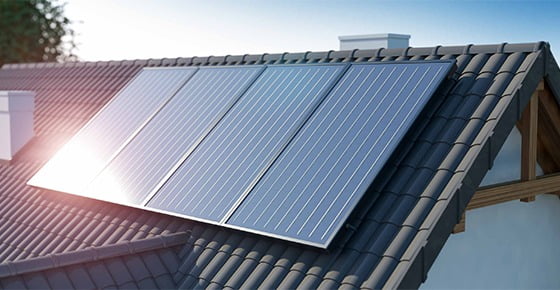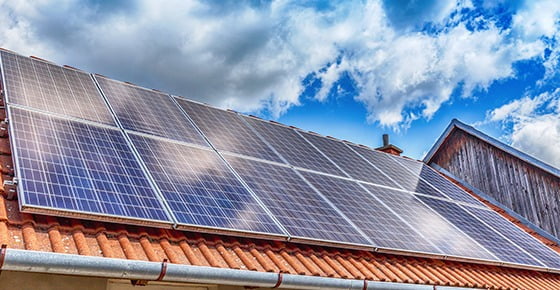Want to Discuss Your Project with Us?
One of our representatives will reach out to you as soon as possible.

Solar thermal panels, also known as solar collectors, are highly effective devices that harness the sun’s energy to heat water or air for use in both domestic and commercial buildings. These innovative panels operate on the basic principle of converting solar energy into heat energy by using a collector and a heat transfer medium.
A solar thermal system can meet 70% of your water and air heating needs throughout the year. And, despite what you may have heard, our solar thermal panels work efficiently even during cold weather.
If you’re searching for an eco-friendly and efficient solution to heat water and space, either for your home or commercial building, solar thermal technology is an excellent choice. Our solar thermal system installation services are particularly designed for solar pool heating, as well as homes and businesses.
We at MAK Energy are honored to be among the top solar thermal installers in the UK. Whether it’s for pool heating, household water heating, or space heating, our team of expert technicians is aware of each installation and the challenges that come with different types of installations. We strive to build and implement a solar thermal system that suits your specific requirements.
Our methodical approach to solar design and installation begins with a thorough assessment of your requirements and ends in a fully installed solar thermal system that complies with all necessary SOPs. Our knowledgeable installers will ensure that your system is installed flawlessly, within the allotted time, and to your satisfaction. So, if you’re ready to take the next step towards a more sustainable and cost-effective way of heating your water and air space.
Therefore, if you’re ready to take the next step towards a more sustainable and cost-effective way of heating your water and air, get in touch with us today to request a quote for our solar thermal systems, including solar pool heating and solar water heaters. There are many solar thermal installers in the market but with MAK Energy, you can trust that you’re working with the best in the business when it comes to solar thermal technology.
Solar thermal panels use the energy from the sun to heat water or air for domestic and commercial entities. The collector is a flat panel that is coated with dark, heat-absorbing material and is designed to absorb as much sunlight as possible. Inside the panel, a series of tubes or pipes are connected to the collector. A liquid, usually water, is pumped through the tubes and absorbs the heat energy from the collector. The heated water is then transferred to a storage tank, where it can be used for various purposes.
We at MAK Energy are honored to be among the top solar thermal installers in the UK. Whether it’s for solar pool heating, household water heating, or space heating, our team of expert technicians is aware of the particular weather conditions in the UK and has the knowledge and experience to build and implement solar thermal system that suit your specific requirements.
For many swimming pool owners, two primary concerns arise. The first is that their pool has limited use during colder off-seasons, and the second is the high cost of maintenance, particularly for pools that require heating. Imagine being able to heat your pool at a very low cost. Fortunately, with the help of a solar energy-powered heater, you can do just that. Our solar pool heating system will work efficiently the whole cold season and will allow you to save on your energy bills and grow your business.
A solar swimming pool heating system uses solar thermal panels to heat outdoor swimming pools, providing a simple and cost-effective way to keep pools warm enough to swim throughout the year. These systems are easy to install and require a solar panel, pipes, and a pump to operate. Solar thermal panels are highly efficient at low temperatures and can raise pool temperature by 5 to 10 degrees Celsius during the day, extending the swimming season by four to five months. Unlike traditional heating systems, solar pool heaters do not rely on electricity or gas, making them environmentally friendly and cost-effective. Additionally, the use of flat plate collectors makes them suitable for heating a large volume of water.
Solar pool heating systems are an uncomplicated yet efficient way to heat your pool. The system typically consists of a flat panel solar collector, a filter, a pump, and some tubing. The collector is mounted on a roof or next to the pool and the swimming pool water is circulated through it, absorbing solar energy which heats the water before returning it to the pool. The system does not require a separate water storage tank, as the pool itself acts as the storage tank. In addition, the pool’s filtration pump can be used to circulate the water through the filter and solar collector, creating an active system with forced circulation of the heated water.
Solar domestic hot water system, also known as solar water heater, offers an economical approach to producing hot water for your household. These systems can be used in any weather condition, and they rely on free and abundant sunshine as their primary energy source. Solar water heater consists of two main components, storage tanks, and solar collectors. These systems are categorized into two types: active and passive. Active solar water heating systems include circulating pumps and controls while passive systems do not require such mechanisms.
Active solar heating systems use solar collectors to absorb and convert sunlight into heat, which is then transferred to a fluid that is circulated through a system of pipes to heat a building or provide hot water. Active solar water heating systems are categorized into two types
Where pumps circulate household water through the collectors and into the home. These systems are suitable for regions with rare freezing.
Where pumps circulate a non-freezing heat-transfer fluid through the collectors and a heat exchanger to heat the water, which then flows into the home. These systems are ideal for areas prone to freezing temperatures.
Passive solar heating systems use building design features, such as orientation, insulation, and thermal mass, to capture, store, and distribute heat from the sun without the use of mechanical or electrical devices. Passive solar water heating systems are typically less expensive than active systems, but their efficiency may not be as high. However, they are generally more reliable and have a longer lifespan. Two types of passive systems are commonly used:
These systems use a storage tank covered with a transparent material to allow sunlight to heat the water. Water flows from the tank to the plumbing system. These systems work best in areas with warm temperatures throughout the year and where hot water is needed both during the day and at night.
These systems have a collector on the roof that heats the water, which then flows through the plumbing system when a hot water faucet is turned on. Most thermosyphon systems have a 40-gallon capacity.
Solar thermal energy used to heat the interior of a building is known as the solar thermal space heating system or solar air heater. This method helps to reduce your home’s heating expenses and decrease your reliance on oil and natural gas, which are all fossil fuels. Solar space heating system, also known as Solar air heater, comes in two different types: active solar space heating system and passive solar space heating system.
Active solar heating systems absorb solar energy and transfer the heat directly to the interior space or storage system for later use. in case of inadequate heat being produced by the solar thermal system to warm the space an auxiliary or backup system provides the additional heat. When a storage system is required, a liquid system is used for heating
Liquid-based heating systems are considered best for central space heating. The collectors used in a liquid base heating system are the same as those used in a domestic solar water heater. There are multiple collectors used in a liquid base system such as evacuated tubes and concentrating tubes, but flat-tube collectors are mostly used. A transfer fluid, also known as water or antifreeze, is circulated through the solar collector through a circulating pump to capture the solar energy. As fluid passes through the collector, it is heated by the sun
Passive solar energy is an innovative solution for space heating that utilizes the entire house as a solar collector. Proper siting and landscaping are essential to maximizing the amount of solar energy entering the building. For instance, orienting most of the windows southwards is a great way to increase solar radiation inside the house.
Thermal mass technology helps to store the captured solar energy. Materials that can absorb, retain and gradually release heat are known as thermal mass. Concrete slabs, tile floors, and masonry walls are examples of materials that have thermal mass. They can store heat during the day and release it when the sun goes down, providing an efficient heating solution.
The lifespan of a solar thermal panel depends on different factors such as panel’s brand, weather condition, and on its usage. But an average solar thermal panel can last more than 20 years and with proper maintenance and cleaning, it can last for 30 years.


Yes! Solar water heaters work on cloudy days, their efficiency and output may lower compared to sunny days. An average solar thermal panel can still produce 20 to 30 energy during cloudy days. modern solar thermal panels are designed to generate electricity even in low-light conditions, and they can still produce a significant amount of power on cloudy days.
Yes! Solar thermal installation can definitely heat your house. It has been designed to heat both domestic and commercial buildings. Solar thermal panels collect heat from the sun and transfer it to a heat exchanger, which can then be used to heat water or air. The heated water or air can be circulated through a home’s heating system, providing warmth throughout the house.


Yes! Investing in solar thermal technology can be highly profitable in the long run. This technology has the ability to continuously provide heating to your home’s water and air with minimal cost throughout the year. The cost-effectiveness and carbon-free nature of solar thermal energy make it an excellent investment for those looking to save money and reduce their carbon footprint.
Solar thermal panels may be slightly more expensive than other solar panels due to the need for an extra pump and storage tank at solar thermal installation. However, they offer significant long-term cost savings on energy bills. The actual cost can vary based on factors such as the number of panels and the solar thermal installation location. Overall, solar thermal panel can be a worthwhile investment for those seeking to reduce their carbon footprint and save on energy costs

One of our representatives will reach out to you as soon as possible.